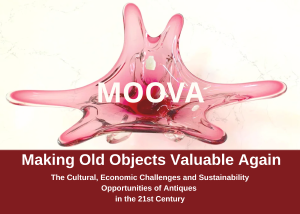
MOOVA
Making Old Objects Valuable Again
in the 21st Century
Website
What do antique porcelain, furniture, and silverware have in common? Most of them fall into the category of informal heritage. Regardless of their cultural significance, many “ordinary” antiques remain on the margins of cultural institutions and scholarly research. As a result, the question of how everyday antiques are safeguarded, valued, marketed, perceived, and consumed remains largely underexplored, placing material evidence of our visual culture in a critical situation, especially in view of the generational and technological transition faced by the sector. In response to this challenge, MOOVA will explore the potential of antiques for developing sustainable heritage, business, and consumption models.
MOOVA's main missions are:
1. To highlight the complex cultural value of ordinary antiques and the patrimonial role of local antique dealers as guardians of informal heritage.
2. To explore the supply and demand for antiques in the digital era, through the lens of their economic value.
3. To understand the perceived value of antiques by Gen Z.
4. To develop theoretical and applied models for reassessing the meaning, relevance, and value of these heritage goods nowadays.
MOOVA’s originality lies in its focus (European decorative arts), transversal approach (cross-objects, markets, countries), and combination of theories, data, and methods from both traditional (heritage studies, socio-anthropology) and non-traditional disciplines (cultural economics, cognitive science, marketing). Data mining, using fresh empirical evidence from interviews and sales results, will lead to the development of our reevaluation models. MOOVA's academic outputs will deal with vital issues such as the preservation of local heritage, audience renewal, and local place branding. Overreaching benefits will include more advanced scholarship and education, risk reduction in business decision-making, job creation, and more sustainable citizenship.

